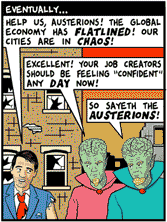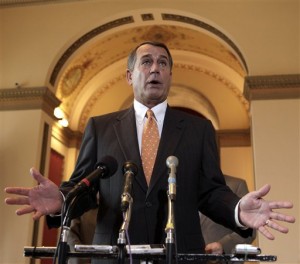There are few things in life more certain than eventual bipartisan agreement on screwing large swaths of our fellow citizens. While I’m glad there won’t be a repeat of the government shutdown / debt ceiling self-immolation ritual, this pattern of gradually ratcheting up the austerity gets very tiresome after two or three cycles. This time, the unemployed get thrown under the bus. What a great way to save money – take food out of the mouths of people who have been down on their luck for more than a year. Freaking 7% unemployment and they’re acting like the jobless are just plain lazy. That’s a truly criminal level of ignorance on the part of elected officials.
One thing, though. Let’s dispense with this notion that the Republicans are somehow against raising taxes. This has been thoroughly debunked since the House went red three years ago. Even before they took office, they killed the “Making Work Pay” tax credit, costing families like mine another $800 a year. Just last year they canceled the payroll tax holiday – another hike. Thanks, Mr. Boehner. This year, it’s a “fee” on air travel. Not something I take personally, but still … a tax by any other name.
And yet they still cling to this label, and the corporate media repeats the myth because it’s the simple thing to do, the path of least resistance. We are supposed to see the disagreements between the parties as a clash of equivalent versions of extremism, when the positions Democrats stake out in this decade are almost identical, save marriage equality, to those held by the Republicans fifteen to twenty years ago. They were conservative then. Democrats, by and large, are conservative now. Republicans are now driven by their hard right, which is more delusional than ever. This week, their leaders chose not to take their lead, but the path they are cutting is a highly conservative one, an extension of the austerity narrative, and one that will keep our economy in stasis for the foreseeable future.
Well, no shut down. Something to give one cheer for. Then it’s back to work.
luv u,
jp


 Then, of course, the Austerians came to power in 2011 and set us on the righteous path of Japan in the 1990s – the path we are crawling along today on our bloody hands and knees. Millions are still out of work, millions more under-employed with zero security, many more working their asses off and still needing SNAP benefits, still needing the support of food pantries. These millions of people are now the favored target of the Austerians. If people are in need, surely it’s their fault and not the fault of policymakers who will do anything rather than invest in economic growth. SNAP has grown to $80 billion a year! they exclaim. What’s their solution? Allocate money for, say, public works projects while interest rates are low so that we can repair and replace our aging infrastructure, invest in our future, and create jobs? God, no! Cut SNAP by $40 billion.
Then, of course, the Austerians came to power in 2011 and set us on the righteous path of Japan in the 1990s – the path we are crawling along today on our bloody hands and knees. Millions are still out of work, millions more under-employed with zero security, many more working their asses off and still needing SNAP benefits, still needing the support of food pantries. These millions of people are now the favored target of the Austerians. If people are in need, surely it’s their fault and not the fault of policymakers who will do anything rather than invest in economic growth. SNAP has grown to $80 billion a year! they exclaim. What’s their solution? Allocate money for, say, public works projects while interest rates are low so that we can repair and replace our aging infrastructure, invest in our future, and create jobs? God, no! Cut SNAP by $40 billion.


 When that happens, people inevitably look for someone to blame. Lately that someone has been unionized public employees. Sad to say, my fellow Americans are all too quick to think the worst of them. That’s not surprising. A lot of editorial ink, political rhetoric, and advertising resources have been placed against vilifying the very notion of working for government. It’s a waste of money, they’re a bunch of lazy layabouts who can’t make it in the private sector, etc., etc. For a long time that blanket criticism seemed confined to, say, the people down at the DMV, but in recent years it’s been expanded to teachers and even public safety employees.
When that happens, people inevitably look for someone to blame. Lately that someone has been unionized public employees. Sad to say, my fellow Americans are all too quick to think the worst of them. That’s not surprising. A lot of editorial ink, political rhetoric, and advertising resources have been placed against vilifying the very notion of working for government. It’s a waste of money, they’re a bunch of lazy layabouts who can’t make it in the private sector, etc., etc. For a long time that blanket criticism seemed confined to, say, the people down at the DMV, but in recent years it’s been expanded to teachers and even public safety employees. John Dewey had it about right when he said that politics is the shadow cast on society by big business. I suppose in his day it wasn’t very different – the wealthy have always pressed their advantage. Perhaps the period from World War II through the 1970s will be seen as unique in American history in the sense that workers had some influence on the economic life of the nation. There was a social contract between the rich and the not-rich that provided the latter with a modest share of the wealth they themselves were creating through their labor. That model has been under attack for decades now, and it is crumbling.
John Dewey had it about right when he said that politics is the shadow cast on society by big business. I suppose in his day it wasn’t very different – the wealthy have always pressed their advantage. Perhaps the period from World War II through the 1970s will be seen as unique in American history in the sense that workers had some influence on the economic life of the nation. There was a social contract between the rich and the not-rich that provided the latter with a modest share of the wealth they themselves were creating through their labor. That model has been under attack for decades now, and it is crumbling. This is where the faulty economic theory part comes in. Take pretty much any one of the Republican candidates’ tax plans, to the extent that they’ve been articulated thus far. Romney, for instance, is touting a 20% across-the-board tax cut. What he’s actually talking about is raising taxes on the bottom third of wage earners, which the G.O.P. field has for several months been describing as woefully undertaxed. Meanwhile, at the top end, the richest of the rich (i.e. the parents of kids too rich to want to hang around with Richy Rich), folks will be seeing an extra $400K or so in their yearly income. All well and good, right? These are the “job creators”, right? The folks who fired your ass so they could afford a second Bentley. They were the ones paying too much, as George W. Bush lamented back in 2000 (which he later fixed with his massive tax cuts).
This is where the faulty economic theory part comes in. Take pretty much any one of the Republican candidates’ tax plans, to the extent that they’ve been articulated thus far. Romney, for instance, is touting a 20% across-the-board tax cut. What he’s actually talking about is raising taxes on the bottom third of wage earners, which the G.O.P. field has for several months been describing as woefully undertaxed. Meanwhile, at the top end, the richest of the rich (i.e. the parents of kids too rich to want to hang around with Richy Rich), folks will be seeing an extra $400K or so in their yearly income. All well and good, right? These are the “job creators”, right? The folks who fired your ass so they could afford a second Bentley. They were the ones paying too much, as George W. Bush lamented back in 2000 (which he later fixed with his massive tax cuts). Well…. maybe we can. There seems to be an overwhelming desire to do so. Not surprising. We’ve seen the result of not holding people accountable. Cheney’s a good example – still on the loose, influencing policy in some fashion. Karl Rove is another one, out raising millions for another crop of right-wing nut jobs. If course, no one has been held to account for the Iraq War, a needless conflict that tore a swath of destruction through an entire nation as well as the military families in America, draining our treasury and putting us at greater risk of attack. Ask any conservative – if you fail to adequately punish lawbreakers, you encourage others to break the law. We have certainly emboldened future presidents to march into any country they care to invade. In fact, Obama already has, without much fanfare or protest.
Well…. maybe we can. There seems to be an overwhelming desire to do so. Not surprising. We’ve seen the result of not holding people accountable. Cheney’s a good example – still on the loose, influencing policy in some fashion. Karl Rove is another one, out raising millions for another crop of right-wing nut jobs. If course, no one has been held to account for the Iraq War, a needless conflict that tore a swath of destruction through an entire nation as well as the military families in America, draining our treasury and putting us at greater risk of attack. Ask any conservative – if you fail to adequately punish lawbreakers, you encourage others to break the law. We have certainly emboldened future presidents to march into any country they care to invade. In fact, Obama already has, without much fanfare or protest. It’s hard to imagine how a war this difficult to justify could last a decade or more on the backs of anything other than an all-volunteer force. If there’d been a draft, these wars might never have started. If the true costs were passed along to taxpayers, they certainly wouldn’t have lasted as long as this. Our nation’s war making power has been effectively insulated from public involvement and, consequently, from meaningful public input as well. America’s wars are now self-contained and self-perpetuating; they are fought by a separate nation of military families – one that bears every burden, pays every price, while we continue our normal lives, only vaguely aware of the catastrophe our elected leaders are visiting upon these unfortunate men, women, and children.
It’s hard to imagine how a war this difficult to justify could last a decade or more on the backs of anything other than an all-volunteer force. If there’d been a draft, these wars might never have started. If the true costs were passed along to taxpayers, they certainly wouldn’t have lasted as long as this. Our nation’s war making power has been effectively insulated from public involvement and, consequently, from meaningful public input as well. America’s wars are now self-contained and self-perpetuating; they are fought by a separate nation of military families – one that bears every burden, pays every price, while we continue our normal lives, only vaguely aware of the catastrophe our elected leaders are visiting upon these unfortunate men, women, and children.